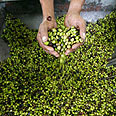
7,630 tons of olives exported in October
צילום: רויטרס
Should Jordan keep exporting olives to Israel?
Official report of rising rates of olive export from Hashemite Kingdom to Israel, amounting to some 300 tons exported per day, awakens public debate on whether trend should be allowed to continue, as it 'comes at the expense of Palestinians brothers'
A lively public debate was stirred last week in Jordan on whether to continue exporting olives to Israel, in light of official reports of a relatively high rate of sales to the Israeli market.
According to the numbers, some 7,630 tons of olives were exported from Jordan to Israel in October, at a pace of some 250 – 300 tons per day.
Abdul Rahman Ghaith, secretary-general of the Jordan Exporters and Producers Association for Fruits and Vegetables, said olive export to Israel in November continued at the same pace as the previous month.
Ghaith said many olive growers are not in favor of export to Israel since they say it "comes at the expense of our Palestinian brothers."
According to Ghaith, Israel systematically sabotages West Bank olive growers, and "compensates" by purchasing olives from Jordan. Ghaith said that in the Jordanian market, the price of one kilogram (2.2 lbs) of olives ranges from $1 to $3, while a 16kg (35.37 lbs) can of olives is sold abroad at the price of around $100.
Engineer Muhammad Bibers, a former member of the Jordan Engineers Associations and an expert on the normalization of ties with Israel according to Al-Jazeera, said there has been stable agricultural trade of certain products between the two countries ever since the peace agreement was signed.
He said Israel regularly exports carrots, mangos and persimmons to Jordan while Jordan regularly exports olives to Israel.
Bibers added that in most cases, the Jordanian consumers are unaware that they are taking in Israeli produce. The Jordanian Ministry of Agriculture recently announced that the kingdom had imported some 3,000 tons of Israeli produce in the first nine months of the year.
Doron Peskin is head of research at Info-Prod Research (Middle East) Ltd










